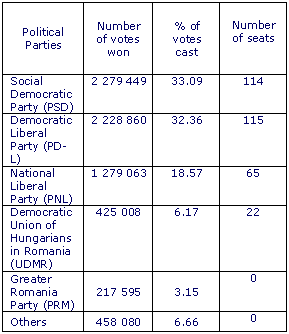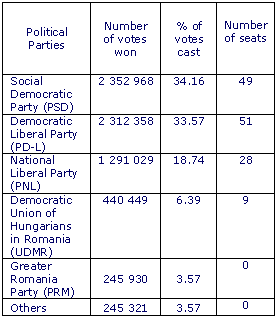News
Corinne Deloy,
Mirabela Lupaescu,
Helen Levy
-

Available versions :
EN

Corinne Deloy
Mirabela Lupaescu
Helen Levy
The main opposition party the Social Democratic Party (PSD) led by Mircea Geoana allied to the Conservative Party (PC) led by Dan Voiculescu won the Romanian parliamentary elections on 30th November slightly ahead of the Democratic Liberal Party (PD-L) led by President of the Republic Traian Basescu.
The PSD won 33.09% of the vote in the general elections and 34.16% in the senatorial elections whilst the PD-L won 32.36% and 33.57%. The National Liberal Party (PNL) led by outgoing Prime Minister Calin Popescu-Tariceanu came third with 18.57% and 18.74%. Finally the Democratic Union of Hungarians in Romania (UDMR), a member of the outgoing coalition and led by Marko Bela won 6.17% and 6.39% thereby becoming the 4th party represented in Parliament.
However the seat distribution system does not correspond to that of the votes.
In spite of its victory in terms of votes the Social Democratic Party has won less seats in both assemblies of Parliament than the Democratic Liberal Party: the PDS has won 114 MPs seats and 49 Senators seats against 115 and 51 for the PD-L respectively; the National Liberal Party has won 65 and 28, the Democratic Union of Hungarians in Romania 22 and 9.
The other parties and notably the far right Greater Romania Party (PRM) which has 48 seats in the Chamber and 21 in the Senate in the previous term in office and which had been in Parliament since 1996 – failed to win the vital 5% of the vote to enter parliament. "I shall take my political retirement," announced Gigi Becali, who is also the owner of the football club Steaua Bucarest.
Turn out was at its lowest rate ever since the fall of Communism – 39.26% i.e. -17.24 points in comparison with the election on 28th November 2004. Rural voters (44.24%) were the greatest in number to fulfil their civic duty in comparison with their urban counterparts (35.63%).
On 28th November Romanian President Traian Basescu had however called on his countrymen to go to ballot. "My message to the Romanians is the following: Vote! The international economic crisis is affecting Romania and its effects will still be felt over the coming months. This is why we need a parliament that represents all Romanians and which is able to counter the effects of the crisis," he declared recalling that people had died so that Romanians could exercise their right to vote in total freedom.
These parliamentary elections were taking part for the first time according to a mixed majority system. Voters selected individual candidates and they did not use the proportional system in support of lists drawn up by the political parties. According to the polls the Romanians like this new voting method. "It would be simplistic to think that a change in voting system would change the political classes overnight," said former President of the Republic (1989-1996 and 2000-2004) Ion Iliescu who put an end to his political career this year.
It was also the first time that parliamentary elections did not take place at the same time as the Presidential election (since the constitutional reform of 2004 the Head of State is elected for five years and his election is therefore separate from that of Parliament). In addition to this since 1st December is a holiday in Romania (celebration of the unification of the Romanian regions in 1918), the election fell in the middle of a long weekend which meant that many were not at home. "I regret that many young people left Bucharest and hope they will return this evening in time to exercise a voting right that was won with great difficulty in December 1989," declared Theodor Stolojan, Vice-President of the PD-L and candidate for the post of Prime Minister. The government decided to offer free train transport to young people aged 18-25 over the weekend to facilitate their participation in the elections since voting was due to take place in their place of residence which for some students rarely corresponds with where they are studying. Finally many incidents (irregular voting slips, corruption attempts etc) were witnessed on the day of voting.
But in the end the low turn out rate showed above all Romanian disinterest in these parliamentary elections and shows how little respect they have for them. According to the polls the population sees Parliament as the most corrupt national institution.
At the end of the voting the polls announced that the Social Democratic Party was the winner – with around 5 points more than the Democratic Liberal Party – then the situation turned to the advantage of the latter. "The first results come from the major towns where the trend was in support of the Democratic Liberal Party – let's wait for the results from the small and average sized towns," said the Social Democratic Party chairman on the morning of 1st December who was still convinced that his party had won; in effect the PDL is better established in the country's rural areas, notably in the East.
Whoever the winner is the National Liberal Party is the inevitable candidate in negotiations for any alliance, likewise but to a lesser degree the Democratic Union of Hungarians in Romania. The PNL leader and outgoing Prime Minister Calin Popescu-Tariceanu thanked his electorate on the announcement of the first results. "You have shown by your vote that you have confidence in the National Liberal Party and in liberal policies and I want to thank you for that. I recall 8 years ago, the National Liberal Party only won 7% of the vote."
On 28th November President Traian Basescu who recalled several times during the electoral campaign that the choice of Prime Minister was entirely his responsibility ("No one can force the name of the future head of government on me,") indicated that the political parties would have ten days to form a government coalition and ten more to choose their candidate for Prime Minister. The Head of State wants the next Romanian government to be formed for 24th December.
According to the Romanian Constitution the President of the Republic appoints the Prime Minister after "consultation with the party that has the absolute majority in Parliament or if there is no majority, the parties represented in Parliament." (article 103-1 of the Fundamental Law).
Traian Basescu has already ruled out appointing Calin Popescu-Tariceanu and Mircea Geoana whom he reproaches for having undertaken a campaign in view of his destitution (12th February 2007, the Social Democratic Party and the Greater Romania Party lodged a request to suspend him from office as President of the Republic due to infringements of the Constitution adopted by Parliament on 17th April. During a referendum on this very subject the Romanians chose to keep their Head of State on 19th May.)
"President Basescu's responsibility is major because Romania is experiencing the most difficult period since 1990," indicated political expert Iosif Boda, adding "because of the electoral campaign the political parties avoided serious talk of the economic crisis and no one dared mention austerity measures which may become vital in 2009." The editorialist of the daily Gandul, Tudor Popescu shares this opinion. "Everything now depends on Traian Basescu's attitude," he stresses saying, "the question is whether he is more concerned with his chances of winning a second mandate as President of the Republic in 2009 or with the need to find a government which will be beneficial to the country." "A coalition rallying the Social Democratic Party and the Democratic Liberal Party would lack coherence and stability to undertake the necessary austerity policy successfully. It would be seen in a "negative" light by the financial markets," reads a paper, published on 27th November, by several economists which also states, "a coalition rallying the Democratic Liberal Party and the National Liberal Party would be better appreciated by the markets but it would be seen as unstable given the incessant disputes that occur between the two movements."
"It seems that it will be harder to create a strong government that is able to guarantee stability. It is very disappointing to see that our political leaders focus exclusively on obscure post-electoral arrangements instead of rapidly implementing measures to fight the crisis," analyses political expert Cornel Nistorescu.
Whichever government coalition succeeds the one led by Calin Popescu-Tariceanu, it will have a difficult task in managing the country's emergence from the crisis. Romania is suffering the full effects of the international financial crisis. Last week the Franco-Romanian car manufacturer Renault-Dacia announced that its sales had fallen by 30% in October in comparison with October 2007 and that it was stopping production until 7th December next. Arcelor Mittal announced the temporary closure of its factory in the west of the country – it employs 1,300 people. The Michelin tyre manufacturer has closed its two factories temporarily.
Romania whose development largely depends on foreign investors is more vulnerable than its neighbours and might be obliged to turn to external aid. The unemployment rate is due to rise over the next few months. The outgoing government announced that 29,000 people would lose their jobs by March next. Finally many fear that the Romanians who left to work abroad – around 10% of the population – who are also affected by the international economic crisis will start to return home. Around 500,000 are likely to return to Romania, a number the country cannot absorb.
During the electoral campaign all the political parties rivalled each other with electoral promises. The Social Democratic party promised to reduce taxes, to increase social subsidies and to double the minimum salary. The Democratic Liberal Party supported the increase in teachers' and healthcare professionals' salaries promulgated by the President of the Republic. Both parties agree on the need to increase public spending to fight the economic crisis.
It is now a question of which government coalition will emerge from this election and which Prime Minister will be chosen by President Basescu.
Results of the general and senatorial elections on 30th November 2008 in Romania
General Elections
Turn out: 39.26%
Senatorial Elections
Turn out: 39.26%
On the same theme
To go further
Elections in Europe
Corinne Deloy
—
4 November 2025
Elections in Europe
Corinne Deloy
—
28 October 2025
Elections in Europe
Corinne Deloy
—
14 October 2025
Elections in Europe
Corinne Deloy
—
7 October 2025

The Letter
Schuman
European news of the week
Unique in its genre, with its 200,000 subscribers and its editions in 6 languages (French, English, German, Spanish, Polish and Ukrainian), it has brought to you, for 15 years, a summary of European news, more needed now than ever
Versions :





